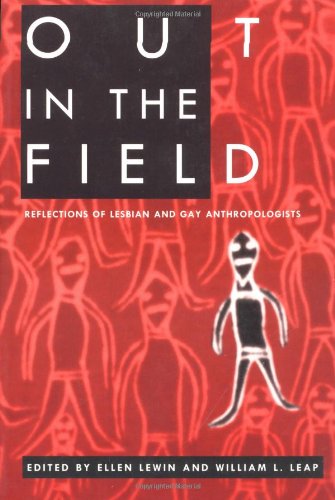Out in the Field
Reflections of Lesbian and Gay Anthropologists
Ellen Lewin; William L. Leap
Similar dilemmas confront them in their careers: Should they pursue research on gay and lesbian topics? How should they present their gender identities in writing and in professional contexts? Such questions are harder to solve than many may realize. As Sue-Ellen Jacobs puts it in her afterword: ‘Homophobia … within departments of anthropology and the American Anthropological Association . . . has required people to appear as mainstream and undifferentiated as possible’ (p. 288). Out in the Field is organized in three sections. In the first, Identity Management in the Field, Geoffrey Burkhart, Liz Goodman, Delores Walters, Walter Williams, and Sabine Lang discuss the choices they made, in various fieldwork contexts, to reveal or hide their gender identities. These stories reveal a fascinating range of unexpected outcomes. In the second section, Transitions, Lewin, Leap, and Ralph Bolton reflect on the management of identity throughout their professional careers, focusing on the revelation or concealment of identity and on the choice to make gay/lesbian topics central to one’s research. (The essays of Burk- hart, Williams, and Jacobs could also have been included in this section.)
In the final section, Representation, Will Roscoe and James Wafer speak to the issue of gender and genre, pondering the utility of various representational styles for gay and lesbian anthropologists writing about gay and lesbian people. Elizabeth Lapovsky Kennedy (with Madeline Davis), Kath Weston, and Esther Newton discuss political, scholarly, and personal relationships to informants and the bearing of those relationships on the writing of ethnographies. Finally, Stephen Murray provides a careful analysis of the relationship between personal (especially sexual) experience and the formulation of social-scientific generalizations. Beyond these individual narratives, the volume as a whole presents a range of positions concerning the relationship of lesbian and gay anthropologists to lesbian and gay informants. At one extreme is Bolton, who argues that despite differences of dialect, the language of gay men in places I have been is the same; we are one tribe in diaspora’ (p. 153).
Less universalistic (but equally romantic) is Williams, who writes of his personal and working relationships to gay or ‘two- spirit’ informants among several Native American groups, yet who also cautions that ‘it is not enough that a person simply be lesbian or gay and expect instant acceptance’ by lesbian and gay Others (p. 81). At the other end of the spectrum are Lewin, Lang, and Kennedy, who show that similar gender identities (re- searchers and informants were lesbians) did not transcend, in their fieldwork experiences, the differences of class and culture that separated them from the women they sought to study. Murray makes the point explicitly with respect to sexual encounters, arguing convincingly that having sex with the natives does not guarantee an anthropologist privileged access to those natives’ understanding of sexuality and gender. Esther Newton provides an interesting twist to this issue with a compelling account of flirtation and erotic attraction between herself and her ‘best informant’ (p. 212). Newton’s essay is not so much an argument to justify having sex with the natives as it is a plea to recognize that sexuality is part of the fieldwork equation. This volume should be of use to all anthropologists interested in the recent history and/or current politics of our discipline. It could also provide a welcome addition to the reading lists of undergraduate and graduate courses in kinship, gender, life history, and ethnographic writing. ~ Richard Handler, American Anthropologist, New Series, Vol. 99, No. 1 (Mar., 1997)
Check for it on:
Details
| ISBN | 9780252065187 |
| Genre | LGBT Studies/Social Sciences |
| Publication Date | 1996 |
| Publisher | University of Illinois Press |
| Editor | Ellen Lewin; William L. Leap |
| Format | Trade Paperback |
| No. of Pages | 315 |
| Language | English |
| Rating | NotRated |
| Editor | Ellen Lewin; William L. Leap |
| Subject | Anthropology – Field Work; Gay Anthropologists; Lesbian Anthropologists |
| BookID | 9435 |
